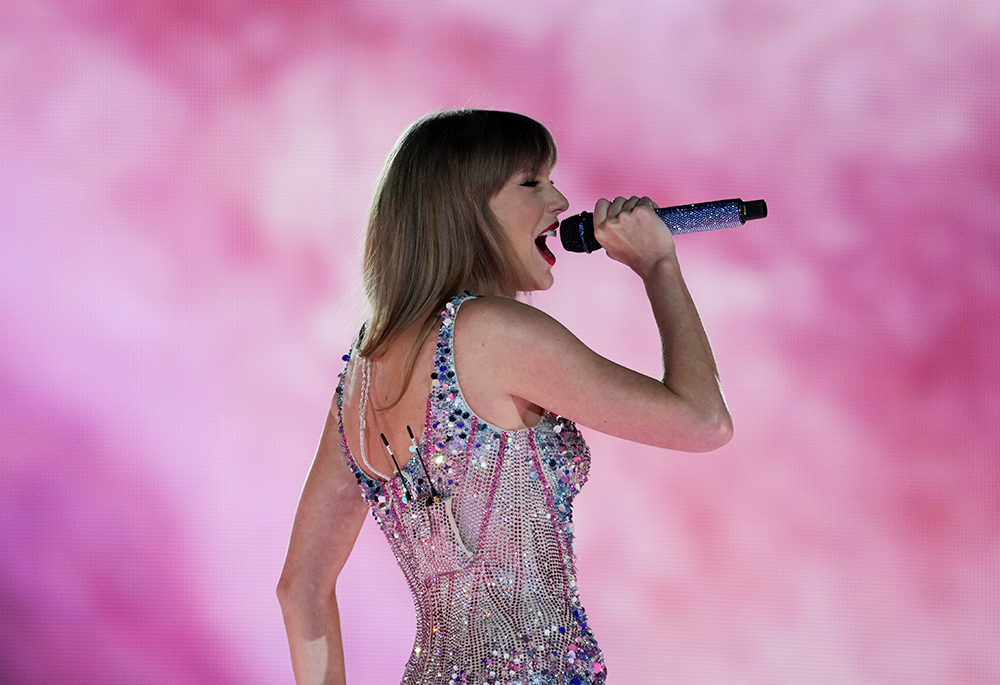
Taylor Swift performs during the opener of her "Eras Tour" on March 17 in Glendale, Arizona. (AP/Ashley Landis)
The power of particularity is familiar to Christians. We worship a universal God who incarnated in a particular time and place, in the particular person of Jesus Christ. Blessed John Duns Scotus coined the term "thisness" to describe the way that God, who creates freely, gives each individual part of creation a unique existence contained within itself.
We are bound together not by uniformity, but by the common fact of a universal Creator who grants each of us a unique particularity. Carlos Schickendantz, an Argentine theologian, explains that the Second Vatican Council document Gaudium et Spes stresses this precise vision of the particular as a link to the universal.
No popular figure today demonstrates the necessity of the particular in service to the universal quite like Taylor Swift (or "Dr. Taylor Alison Swift," as I have taken to referring to her after she was awarded an honorary doctorate last year from New York University). Through deeply confessional, vulnerable and unique lyrics, she zeroes in on the particulars of her own experience to relate more universally.
I do not mean to suggest that she is as universal as Jesus Christ is, but with a 52-date tour of stadiums with hundreds of thousands of people, she has managed to create music that is much more universal than most other things or people in the world.

Taylor Swift performs in Los Angeles during the "Red Tour" in 2013. (Wikimedia Commons/Denielle)
I was 13 when I first started listening to Swift's music on my iPod Nano. I was 16 when I first saw her play live on her "Red Tour." A decade later, I got to see her again at the "Eras Tour," just two weeks ago.
As I watched her perform, it struck me that the same artist was able to resonate with me, albeit in different ways, at 13, 16 and 26, while also being relatable to the 80,000 unique strangers in the stadium. Hearing that many people yell out, "F-ck the patriarchy!" from "All Too Well" — a song about her heartbreak at the hand of an older male partner — was a spiritual experience for this feminist theologian. The song was also one of those she lost the rights to the original recording masters, at the hands of powerful males in the music industry.
Swift's introduction to the song "Lover" gave a hint that she knows that the power of her songs is in their ability to name universal feelings using her own experiences. She said, "This song is about a feeling I felt at some point in my life, but now, Foxborough, it is about us and the memories we make together."
The song describes not the feeling of falling in love or falling out of love, but of being in love, of being close emotionally (and spiritually, I would argue, although it is less explicit): "Can I go where you go? / Can we always be this close?"
The entire "Eras Tour," in which she plays the most beloved songs from across her catalog, is a testament to the artist's brilliance and the fact that her success cannot be attributed to simply "fun music."
That hypothesis misses the sustained popularity across her career, despite being one of the few artists who have been able to effectively change genres. She started off as a country singer, transitioned into contemporary pop-country, released several purely pop albums, and spent the pandemic recording indie folk and alternative rock.
All of these albums broke sales records and received numerous awards. Her audience has followed her outside of their own genre comfort zones. There is an appeal there beyond just music.
Advertisement
Swift's success has been in her ability to change while remaining true to her own gifts as a singer-songwriter, sticking to experience as a source for her lyrics. Even her album "Folklore," a product of her imagination rather than her own life, picks up on vivid scenes of the teenage character's lives. Swift writes characters that can speak to audiences beyond themselves.
The theology of the Catholic Church and Swift's lyrics share an appreciation of the primacy of the particular: not at the cost of the universal, but at its service. For Catholics, the prizing of the particular works in service to a universal God.
Swift, however, has something the Catholic Church currently does not: an increasing popularity among young people. Of course, not everything popular is valuable. In this case, though, the formal similarity between how she and the Catholic Church approach universality suggests that her gifts (am I allowed to say "charisms"?) offer a lot to learn.
Swift's method of creating songs does not invoke "love" in vague universal terms or to impose abstract principles of "forgiveness." Instead, she names the particular love or betrayal, its contours, the way it made her feel.
The lyrics in "All Too Well" — which the internet calls "the perfect breakup song" — are an example. After describing the specific scarf she left at his sister's house and the cold weather of the first time meeting his family, she sings during the bridge, "Call me up again just to break me like a promise / so casually cruel in the name of being honest."
The song is about her own experience but describes perfectly the relatable double-sided coin of honesty in intimate relationships. The truth is sometimes too cruel to handle.
Swift is not relatable to everyone, and there is valid criticism of the way she has handled political situations in the past and in the present. Still, her hope in experience as a source for deep truths is admirable. It reminds me of what the Church teaches in Dei Verbum: the experience of believers, contemplated and reflected on, is a source of the tradition.
The church, therefore, can learn from Swift as she plays out what is written in our own belief system, teachings and God's self-communication: particularity matters. A pilgrim church is one that is constantly in need of reformation, of a genre-shift, if you will, but that does not mean we lose who we are and we do not have to fear that.
The church has a lot to offer to young people — community, a belief in something larger than themselves, and access to God in Jesus Christ — but those things will get lost in the mix if the church continues to pit universal principles against the unique problems in the lives of young people. Rather, as Swift can attest, particularity, uniqueness and personal experience are profound sources for communal and universal truths.








